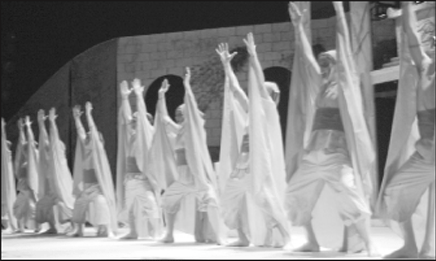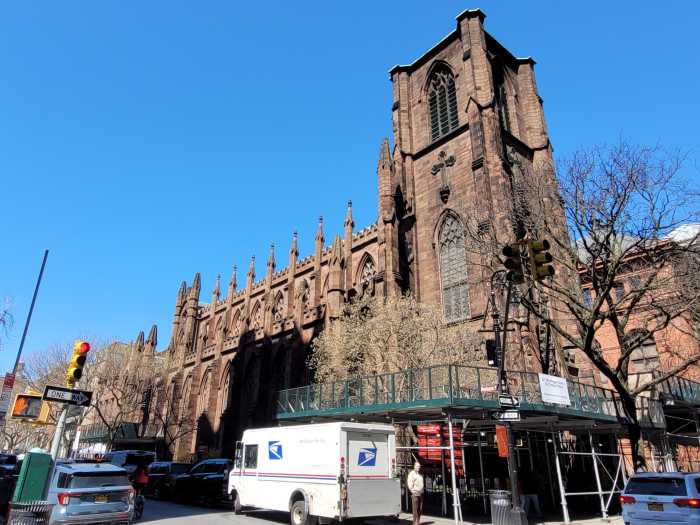By Jerry Tallmer
Sophocles gave us “Antigone” early in the 4th century B.C. Ireland’s Nobel Prizewinner Seamus Heaney gave us “The Burial at Thebes,” his poetic current-vernacular translation of “Antigone,” early in the 21st.
In the Heaney 2004 rendering, a good share of the words, and the mind-set, of Creon, King of Thebes — rigidly determined to put Antigone to death for violating his edict to let the corpse of her brother, Polynices, rot on the open ground for dogs and vultures to feed on — have the ring of someone rather familiar to most us these past six years.
The throne has come to me.
Until a man has passed this test of office
And proved himself in the exercise of power
He can’t be truly known — for what he is, I mean,
In his heart and mind and capabilities …
My nerve’s not going to fail …
This is where I stand when it comes to Thebes:
Never to grant traitors and subversives
Equal footing with loyal citizens,
But to honour patriots in life and death …
Get her [Antigone] away from here.
And the other one [her sister Ismene].
Women were never meant for this assembly.
From now on they’ll be kept in place again.
That’s where the parallel breaks down, because, for better or for worse, our latter-day Creon does have his Condi, not to mention his Laura.
Alexander Harrington, the large, enthusiastic soon-to-be-40-year-old director of “The Burial at Thebes” that opened January 25 for a hitch through February 11 at La MaMa, can’t help agreeing to some extent with what Garry Wills wrote in a review at the time of the Heaney text’s publication.
“Wills said the poetry is beautiful, but that Heaney irons out some of Sophocles’s criticism of Antigone, who is also guilty of hubris.”
What Wills more directly wrote: “There are good reasons for opposing the invasion of Iraq, but none that Sophocles can provide.”
What Heaney himself has written in a postscript to his translation is, in part: “Just as Creon forced the citizens of Thebes into an either/or situation in relation to Antigone, the Bush administration in the White House was using the same tactic to forward an argument for war on Iraq.”
But the persona of Creon in earlier translations, says director Harrington, “is not so much about power as what is necessary to govern.”
Alex Harrington was 21 when his father, radical Roman Catholic Irish-American Socialist author of the high-impact “The Other America: Poverty in the United States,” died of cancer at 61, in 1989, leaving behind wife Stephanie Gervis Harrington and their sons Alex and Edward Michael, called Ted.
What would your father (a friend of this journalist) have thought of the political edge in Heaney’s “Antigone”?
“I think my father and I had similar views. I find ambiguity more powerful than didacticism. In Sophocles, this is not just an anti-Creon play. On the other hand, my job as director is to serve the playwright.
“I think my father would agree. But there was one thing he would always correct me on, when I was a kid. He would sort of snap at me when I made my wise-ass wisecracks about conservatives [such as another friend of Michael Harrington, William F. Buckley, Jr.].
“My father once said to me: ‘I would trust Bill Buckley with you and your brother if anything happened to Stephanie and me.’ And when I made a wise-ass remark about John Wayne, he said: ‘Never judge an artist by his politics.’ Which is true. I mean look at Dostoevski and ‘The Brothers Karamazov.’ ”
Alex Harrington — his brother is a lawyer — came out of Columbia University with a B.A. in 1990, out of Louisiana State with an M.F.A. in Theater in 2002. The direction of “Antigone” was sort of thrust on him when, during a 2005 job interview at Clemson University, South Carolina, he confessed to a special interest in tragedy.
“That had begun when I read Nietzche’s ‘Birth of Tragedy,’ a nutty book but inspiring, and a good practical guide to any director.”
Before Clemson, where he is now an assistant professor of Theater, he had “been merrily involved Off-Off-Broadway while working at the Acker Merrall wine shop on West 72nd Street.”
Inspired by the ritualistic achievements of Ellen Stewart, Andre Serban, and Elizabeth Swados, in 1997 he mounted a big reversed-stage production at La MaMa of the “Agamemnon” of Aeschylus. Two years later he founded the Eleventh Hour Theatre Company which bowed at La MaMa with “Henry V.” He there has since done “Henry IV, Parts 1 and 2” and the forementioned “Brothers Karamazov.”
The “Burial at Thebes” Harrington brings now to Ellen Stewart’s emporium has Carman Moore as composer, Harrington as director, and recent Clemson student Claire Pavlich — “so it’s three generations” — as choreographer.
Heading the large cast are Jessica Crandall as Antigone, Frank Anderson as Creon, Louise Flory as Ismene, Raymond McAnally as First Guard, John McCarthy as Haemon (Creon’s son, lover of Antigone), and Liz Forst as the angry blind prophet, Tiresias.
Alex Harrington considers himself more of “a textural director” than Ellen Stewart, who famously and openly has little use for dramas full of words. But, but …
“Ellen has said to me — some day I’m going to put this on a wall — ‘You’re the only director of these word plays that I can sit through the whole thing. I sat through the whole of your “Henry V.” Do you know what that means?’”
“The Burial at Thebes” has lots of words. All Seamus Heaney’s. Some, even, by Sophocles.
THE BURIAL AT THEBES. By Seamus Heaney, from the original by Sophocles. Directed by Alexander Harrington. Through February 11 at La MaMa E.T.C., 74-A East 4th Street, (212) 475-7710.































